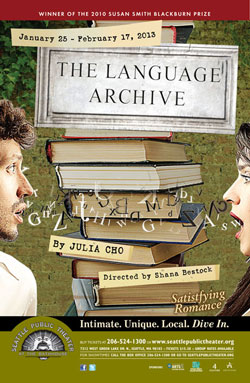 How can you personalize and internalize an experience – especially an art experience? How can you give it legs and make it more than an entertaining night out? How can you share the experience with others in a meaningful way?
How can you personalize and internalize an experience – especially an art experience? How can you give it legs and make it more than an entertaining night out? How can you share the experience with others in a meaningful way?
Publishing houses answered those questions years ago when they realized that personal contact between author and reader created buzz and sold books. The book tour is now a sophisticated marketing tool designed to introduce the author, create a following and provide feedback. It isn’t just a way to sell books to the devoted junkies that attend the readings. Local radio and TV interviews expand and draw the audience to the author’s work and expand his or her reach beyond the range of the NY Times Book Review. Lately publishers have seen gold in book clubs and added reading group discussion guides as addenda to the paperback versions. Museums, symphony orchestras and stage companies have jumped on the bandwagon and are personalizing the audience experience by having the curators, directors, actors, and artists meet with their audiences following a performance to discuss their work.
These Q&A sessions can be interesting. The audience members who attend them are serious, curious, and appreciate the effort. They’re hungry to discuss the performance with others and to question the writers, directors, actors, musicians, and artists involved about the intent and meaning of the art. At the end of an evening Q&A I feel more involved and more knowledgeable about what I have seen, heard, or read, and I’ve internalized the experience.
For example, on Friday night Marilynn and I attended the opening night performance of a play called The Language Archive. The play, at Seattle Public Theater’s Bathhouse, is an oddly provocative inquiry into communication and interpersonal connections. The main character in the story is a linguistics professor who speaks a dozen languages but is clueless when it comes to communication with his wife. His interest in communication is purely academic. His wife is equally clueless and displays her feelings through wordless, tearful episodes while performing simple household tasks like ironing or washing dishes. The professor’s academic interest in preserving dying languages leads him to two elderly research subjects, who speak a soon to be extinct language, but who revert to English profanity whenever they get upset and their own language doesn’t give them the power to insult, slander, and abuse.
California based playwright, Julia Cho, the daughter of Korean immigrants, already has an impressive list of playwriting credits, and if I see her name again I’ll be sure to see whatever it is she’s doing.The Language Archive may not be great theater but it is entertaining, and live theater is an intimate personal experience – this one included. After the opening night performance the director, Shana Bestock, stayed for a Q&A and the audience was able to ask questions making the evening an even more personal experience.
The Weekend section of the Seattle Times lists local stage offerings every Friday and I’ve been surprised and impressed by the quality and variety of Seattle theater productions. We’ve seen three plays at the Bathhouse in the last year and two of the three were better than two of the three plays we saw in New York On Broadway in December. The Language Archive runs through June 9th at the Bathhouse Theater at Green Lake.
In the same vein; SIFF, the Seattle International Film Festival opened over the weekend. Film festivals provide excellent opportunities to experience the same up close experience through Q&A with actors, directors and writers. I always find it hard to choose from the extensive catalog of festival films in spite of the fact that there is good online and local print coverage of the the festival. Sometimes an interesting subject or a film with a good publicity machine behind it will pop up or someone will make a personal recommendation and make it easier to choose. That happened yesterday when What Maisie Knew was presented.
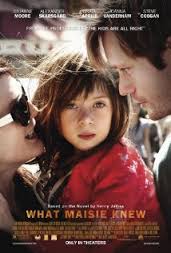 Maisie is an adaptation of an 1897 novel by Henry James adapted, updated, and modernized for the screen. I might have missed it but one of the co-directors is a close friend of a friend of mine and we have been following each others progress for 30 years. David Siegel is a Berkeley grad as is co-director, Scott McGeehee. Neither one is a film school graduate but the two of them have been writing and directing as a team for years. Their credits include The Deep End with Tilda Swinton, Uncertainty with Joseph Gordon-Leavitt, and Bee Season with Richard Gere and Juliette Binoche. None of them have been blockbuster hits but they get enough good reviews to keep making the films they love. A.O. Scott in his New York Times review called What Maisie Knew “a brilliant, haunting adaptation” of the James novel.
Maisie is an adaptation of an 1897 novel by Henry James adapted, updated, and modernized for the screen. I might have missed it but one of the co-directors is a close friend of a friend of mine and we have been following each others progress for 30 years. David Siegel is a Berkeley grad as is co-director, Scott McGeehee. Neither one is a film school graduate but the two of them have been writing and directing as a team for years. Their credits include The Deep End with Tilda Swinton, Uncertainty with Joseph Gordon-Leavitt, and Bee Season with Richard Gere and Juliette Binoche. None of them have been blockbuster hits but they get enough good reviews to keep making the films they love. A.O. Scott in his New York Times review called What Maisie Knew “a brilliant, haunting adaptation” of the James novel.
Maisie is the story of a 6 year old child of uncommonly narcissistic parents who are coming undone as a couple. The mother is a rock musician, the father an international art dealer and businessman. Both of them love Maisie when it’s convenient or when they want to punish each other. The rest of the time Maisie is an inconvenient obligation subordinate to the narcissistic pursuit of their other interests. The two other characters who emerge as the story develops are her nanny/stepmother and bartender/stepfather who become convenient after-market caregivers that solve the parents caregiving problems after the divorce. It’s not a pretty story. I have to say it did make me look at my own selfish behaviors over the years. Still, this is Maisie’s story and not everyone in Maisie’s life turns out to be bad news. You’ll have to see the movie to find the outcome. The film opens nationwide next week. See it.




























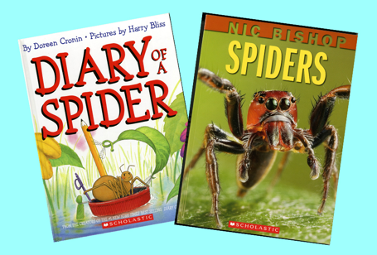

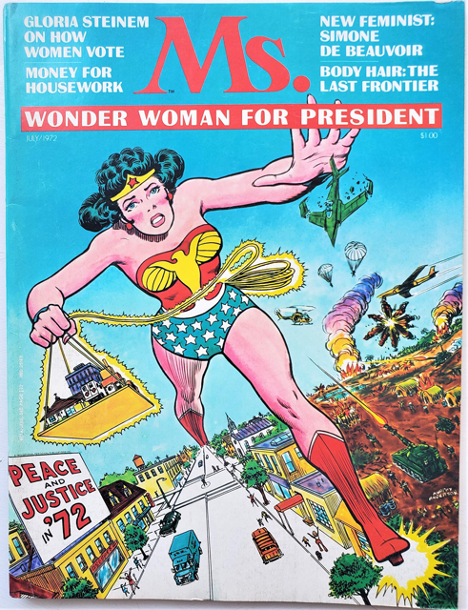
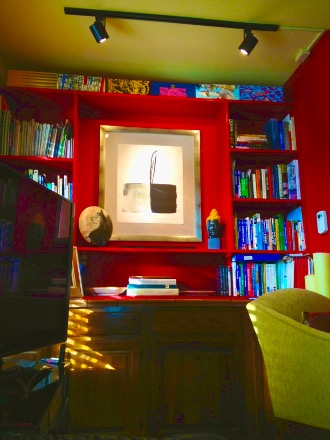
Hey Jack,
Reading all but traveling in Turkey with little time to write the coherent response I’m trying to to formulate apropos the last three very brave posts. Keep trying then don’t like what I’ve tried to say or how I’ve said it.. But will. I am touched by your candor. Keep wondering how your kids are responding if at all. All you talk about is very familiar and resonates deeply. More when I can find the time and say something meaningful.
Love, Leslie
Envoyé de mon iPad
Jack,
Thank you so much for your continued support of Seattle Public Theater. So happy to hear THE LANGUAGE ARCHIVE provoked insight and conversation. Please drop me a line. I’d love to loop you in to more of what we’re doing this coming season at SPT.
Best,
Cole Hornaday
Communication and PR Manager
Seattle Public Theater